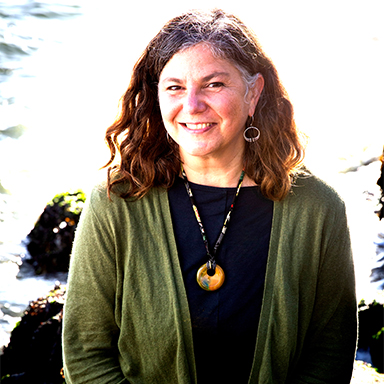Karina Nielsen, Executive Director of Francisco State University’s Estuary & Ocean Science Center
Karina Nielsen, Executive Director of Francisco State University’s Estuary & Ocean Science Center

Karina Nielsen was a world traveler before she had her first birthday. The Executive Director of Francisco State University’s Estuary & Ocean Science Center was born in Argentina and almost immediately was taken to the West African country of Ghana.
She quips that her love of the ocean may have come from playing in her crib as it sat on the beach with the sound of the Atlantic Ocean’s waves lulling her to sleep.
Her dad’s work with an international lumber company took the family all over the world, but they ended up in New York City where Karina went to high school.
While still a youngster, she “fell in love” with science and, in particular, life in the ocean. “Even back then, I was interested in the environment,” she says, “and I thought science was the best way to do good in the world for nature.”
At Hampshire College, she studied photography and then, for a few years, became an artist who produced large-format black and white photos, supporting herself with jobs as a waitress, bartender, cook and finally manager for a small restaurant in New York City. “I was a ‘foodie’ before it was a thing to be,” she says.
Married in 1983, her son, Aeon, was born and she stayed at home for a while, but her interest in science and the environment drew her back to school.
She earned her B.S. degree in biology from Brooklyn College in 1992, spending two summers researching the ecology of mussels living at the edge of the salt marshes around New York City. During this study, she thought the marsh was quickly eroding – and a number of years later, colleagues discovered that it really was eroding due to sea level rise, invasive snails and reduced sediment supply related to coastal development.
“The whole focus of my career has been trying to use science to understand how things in nature work and how we can solve environmental problems,” she says. “It’s like solving a puzzle. First, you observe and then you try to figure out what’s going on.”
She went on to receive her Ph.D. in marine ecology from Oregon State University. “That was an amazing time in my life,” she says. “I worked with two incredible scientists, Bruce Menge and Jane Lubchenco, who were my mentors for six years.”
Lubchenco went on to become the Undersecretary of Commerce for Oceans and Atmosphere and then was Administrator of the National Oceanic and Atmospheric Administration.
After graduation in 1998, the National Science Foundation awarded Karina with an International Postdoctoral Fellowship to work at Universidad Católica’s Estación Costera de Investigaciones Marinas, and the family lived in Chile for the next two years. Here, she studied plant and animal life at the edge of the sea.
Back in the states, Dr. Nielsen completed a second Postdoctoral Fellowship with the Partnership for Interdisciplinary Studies of Coastal Oceans at Oregon State. She then spent 11 years as a professor at Sonoma State University before being recruited by San Francisco State University in 2014.
“This is such an extraordinary site,” she says of the Tiburon campus. “It’s not only a living marine laboratory with the primary purpose to give students a hands-on opportunity to do research projects where they can learn to become scientists, but it also has a deep history.
The history of this site on the backside of the Tiburon Peninsula includes use by Coast Miwok, a cod fishery business, a coaling station for the U.S. Navy’s ships and Teddy Roosevelt’s “Great White Fleet,” where its 16 battleships plus support vessels stopped to refuel before crossing the Pacific in its famous worldwide cruise. This also was where the suspender cables for the Golden Gate Bridge were built and where a seven-mile long anti-submarine net was made to keep out Japanese vessels during World War II. Many local residents still call it the “net depot.”
Karina and her husband, Michael, live in Tiburon. Michael is retired and son Aeon recently married and is living in Oregon. As for Karina, she says she enjoys hiking, reading, cooking, visiting with friends and “being in nature.”

